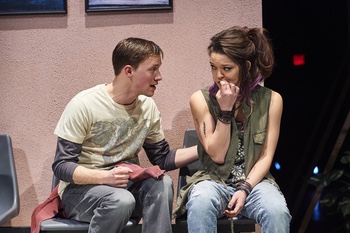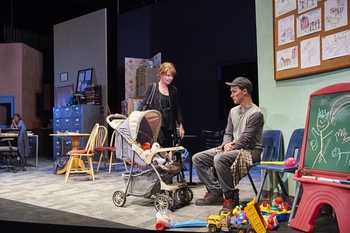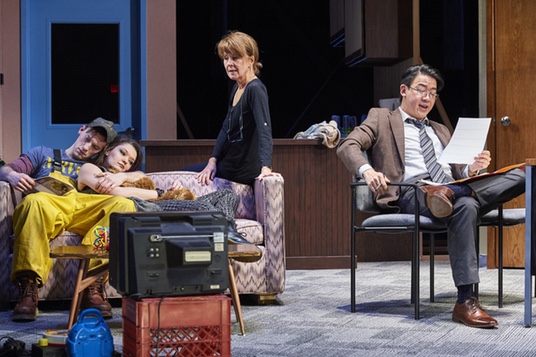Through Sun 3/20
As revealed in the CPH program 43 percent of children placed in the child welfare system in Ohio are eventually returned to their families, 24 percent are taken in by relatives (“kinship care”), 15 percent are adopted and 14 percent stay in the system until they become adults.
What really is the child welfare system, how does it work, is it successful? Few outside of those who have been involved with its workings have any idea of the machinations and the potential horrors faced by those who are participants.
When something goes wrong in the child welfare system, who is responsible? Normally, the spotlight goes onto the parent(s) who don’t have the skills or the lifestyle to accommodate a child. Sometimes it appears to be the social service system — the underfunded, short-staffed organization which sometimes finds itself with poor leadership, burned-out social workers and internal conflicts. Sometimes the problem is the foster care “parents” who take on the children for selfish or financial reasons. Whatever, sometimes the child welfare system just doesn’t work.
Rebecca Gilman’s Luna Gale, now being staged at Cleveland Play House, asks the question, “How do we make the right decision where there is no clear right choice as it relates to Luna Gale, an infant with druggie parents, a religious fanatic grandmother with an agenda, and a burned-out social worker in a dysfunctional organization?”

The story concerns Caroline, a long-time social worker, whose most recent case centers on Peter and Karlie, two teenage drug addicts who, after bringing their sick daughter Luna Gale to a hospital, are accused of neglecting the child. Can the two be rehabilitated so they can take care of their child in a healthy way? Is it best to place her with her maternal grandmother who is a religious fanatic whose purpose in taking the child appears to be to “save her” for the Lord? Or should she be placed in foster care?
As the story unfolds, we discover deep secrets in Karlie’s past and are led to believe that her mother Cindy had a hand in driving her daughter to escape from the real world.
A subplot centers on Lourdes, a “success story” of foster care, who has made it through the system and is off to college to pursue her dreams, or maybe the dreams of Caroline, desperate to prove that her efforts and good intentions are worth it all. But Caroline has a secret that is as deep as Karlie’s and Lourdes’.
Rebecca Gilman has crafted a well-written play, made of real conversations, plausible conflicts, some emotional-inducing plot twists and a “hopeful” ending that challenges credibility, a kind of feel-good ending that is probably more to let the audience go home happy than dealing with statistical realities.
Austin Pendleton has directed the play with creativity. Rather than having scene follow scene with the usual set changes, he has worked with scenic designer Michael Schweikardt to create a stage in which the fragmented scenery is interconnected. This allows actors to flow from area to area with ease, keep the continuity seamless, and allow characters to observe each other in real time. The effect is powerful.
The cast, which has a strong contingent of Case Western Reserve/Cleveland Play House MFA Acting Program students, and their associate director, is universally strong.
Jeremiah Clapp shines as the drugged-out Peter, Luna Gale’s father, who takes advantage of an intervention and rises to be a hero who may well save the child’s emotional and physical life. He is balanced by Megan King, who nicely textures the role of Karlie, Luna Gale’s mother, who in the end realizes that she is and could be more of a detriment than an aid in the child’s future.
Lee Roy Rogers shows tremendous acting depth in showcasing Caroline’s personal conflict as a woman who has put out years of effort to try and erase her problems by serving the needs of others, but has probably reached the emotional end of the road.
Angela Pierce clearly develops Cindy, Karlie’s mother, into a woman who has been “saved” and wants that for her granddaughter. Pierce nicely spotlights that, though the character’s outward motives are clear, her underlying guilt may well be the reason for her actions.
Donald Carrier (Pastor Jay) has a pivotal scene in which he tries to win Caroline to his side by praying with her. Carrier is so effective that he moves all with his charismatic fervor.

Athena Colón is impressive in presenting a Lourdes who appears to be stronger than she is in fighting to shed the effects of her past life, which couldn’t be erased, even through a seemingly successful foster care experience. Kenneth Lee is often hard to hear and understand as he portrays Cliff, Caroline’s supervisor.
CAPSULE JUDGMENT: One of the purposes of good theater is to enlighten and educate an audience. Luna Gale does just that as it continues CPH’s quality centennial season. The script is well written, the acting topnotch, the directing spot on. This is a must-see for anyone who wants to experience an emotionally wrenching tale of the real world of social work and the fragile child welfare system.
LUNA GALE runs through Sun 3/20 at the Allen Theatre in PlayhouseSquare. For tickets call 216-241-6000 or go to clevelandplayhouse.com.
[Written by Roy Berko, member, American Theatre Critics Association, Cleveland Critics Circle]Cleveland, OH 44115
